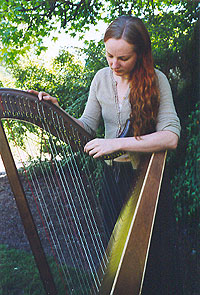| B i o g r a p h y |
 The
Celtic Ensemble class molds together instruments and singers into a
Celtic band, culminating in a performance in the Eugene community. They
learn Gaelic waulking songs, port-a-beul, Welsh airs, Irish jigs and
reels. All instruments are welcome, especially fiddle, flute, guitar,
and harp. This is also an opportunity to learn to play a traditional
instrument, like concertina, bodhran, or penny-whistle.
The
Celtic Ensemble class molds together instruments and singers into a
Celtic band, culminating in a performance in the Eugene community. They
learn Gaelic waulking songs, port-a-beul, Welsh airs, Irish jigs and
reels. All instruments are welcome, especially fiddle, flute, guitar,
and harp. This is also an opportunity to learn to play a traditional
instrument, like concertina, bodhran, or penny-whistle.
* * *
Celtic music means two things mainly. The first: the music of the
peoples calling themselves Celts (a non-musicologistic definition which
we can compare with French music, European music). The second: what is
shared only by the musics of the Celtic Nations (a musical
definition).We see further that some consider there is nothing, some
others say there is (as Alan Stivell).
Often, the term Celtic music is applied to the music of Ireland and Scotland, because both places have produced well-known distinctive styles which actually have genuine commonality and clear mutual influences. They are famous too because of the importance of Irish and Scottish ascendants in the English speaking world. The music of Wales, Cornwall, Isle of Man, Brittany, Northumbria and Galicia are also frequently considered a part of Celtic music, the Celtic tradition being particularly strong in Brittany, where Celtic festivals large and small take place throughout the year and because of Alan Stivell's recordings and tours. Finally, the music of ethnically Celtic peoples abroad are also considered, especially in Canada and the United States.